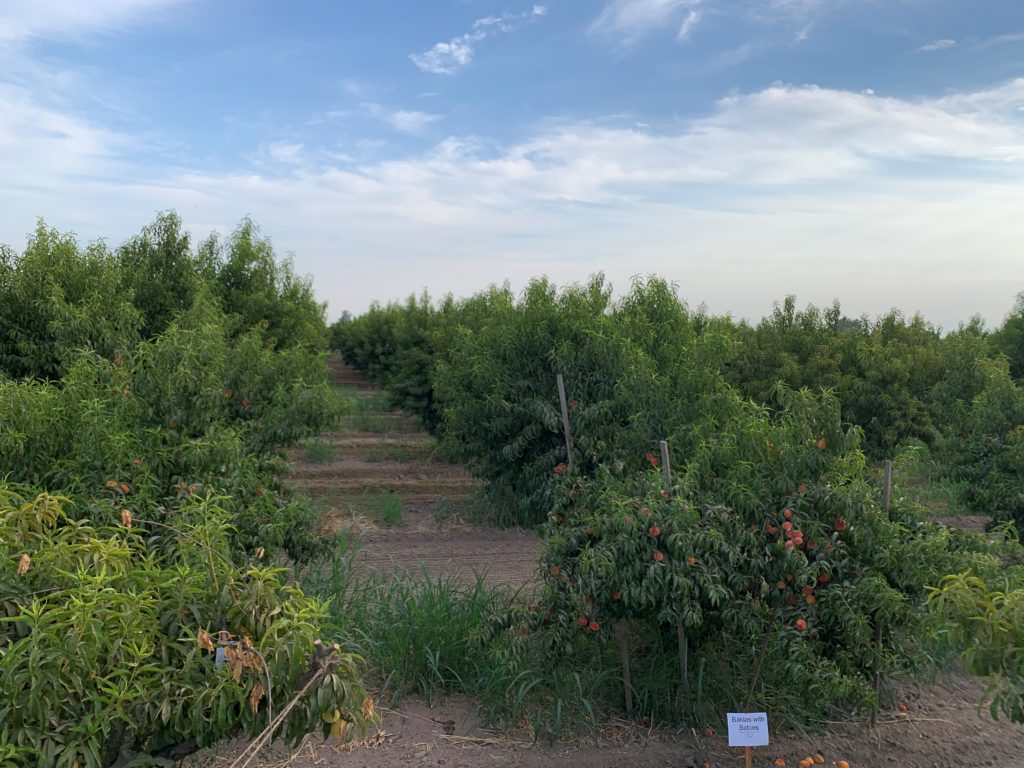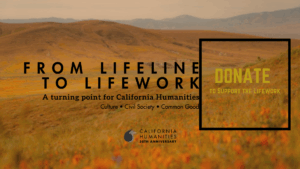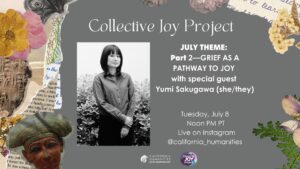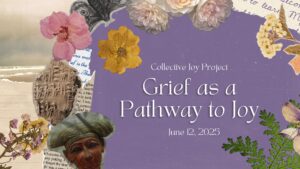Recently, Nikiko Masumoto–farmer, artist, writer–spoke with California Humanities’ President & CEO Julie Fry as the stone fruit harvest came to an end in August at Masumoto Family Farm in Del Rey in the Central Valley.
Julie Fry: On your family farm, you have adopted a unique human-centered approach to ensuring that you have the optimal amount of people available to work on the farm. Can you tell us more about this?
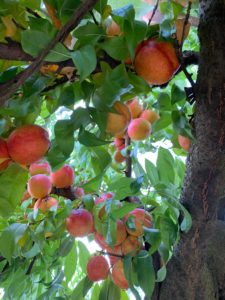 Nikiko Masumoto: What a life-affirming description of a way of working. Thank you for that! You’ve captured our aspirations. When I hear the term human-centered approach, I think of values that resist and work against extraction economics. In a human-centered approach to labor, we want our values to drive the work: compassion, dignity, collectivity, and listening. We continue to try to design our operation to match the team we have (example: adapting equipment to fit our team and us, changing working schedules to accommodate seasons in life); we try to center listening. Human-centered means building relationships beyond the “payday.” One of the most rewarding moments for me this year was being invited to witness a tremendous moment of growth for one of our younger employees. They competed in a virtual speaking contest and won a prize! We all were so proud and were completely overcome with humility when they thanked their family and us for support. It was one of those surprise moments of thanks that really touched my heart. Showing up to support someone outside of what is required in a working relationship is powerful. Seemingly small gestures can add up to a lifelong practice of valuing people in their wholeness and complexity.
Nikiko Masumoto: What a life-affirming description of a way of working. Thank you for that! You’ve captured our aspirations. When I hear the term human-centered approach, I think of values that resist and work against extraction economics. In a human-centered approach to labor, we want our values to drive the work: compassion, dignity, collectivity, and listening. We continue to try to design our operation to match the team we have (example: adapting equipment to fit our team and us, changing working schedules to accommodate seasons in life); we try to center listening. Human-centered means building relationships beyond the “payday.” One of the most rewarding moments for me this year was being invited to witness a tremendous moment of growth for one of our younger employees. They competed in a virtual speaking contest and won a prize! We all were so proud and were completely overcome with humility when they thanked their family and us for support. It was one of those surprise moments of thanks that really touched my heart. Showing up to support someone outside of what is required in a working relationship is powerful. Seemingly small gestures can add up to a lifelong practice of valuing people in their wholeness and complexity.
Julie: The Adopt-a-Tree program is another innovative way of bringing community members to the land while enabling you to complete the harvest. What is the genesis of this program, and how did it evolve over the years?
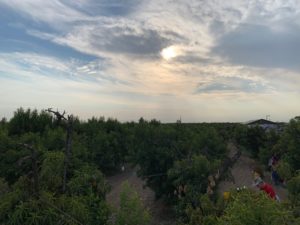 Nikiko: My parents were the innovators in our Adopt-A-Tree program. It began with a quest to grow Elberta peaches – an heirloom variety that is rare in commercial growing. One of its many challenges: it bruises very easily. Undeterred, my parents planted some trees and asked: what would happen if we brought the eaters to the farm instead of sending the fruit to them? That single question has evolved into deep reflections and experiments of connection. Some teams have been coming for 17 years! A community of people (like you, Julie!) have ritualized returning to our farm and have deepened relationships with where their food comes from. It has been so beautiful to witness. I could ask you so many questions: What has the experience of adopting been like? What has been surprising or meaningful?
Nikiko: My parents were the innovators in our Adopt-A-Tree program. It began with a quest to grow Elberta peaches – an heirloom variety that is rare in commercial growing. One of its many challenges: it bruises very easily. Undeterred, my parents planted some trees and asked: what would happen if we brought the eaters to the farm instead of sending the fruit to them? That single question has evolved into deep reflections and experiments of connection. Some teams have been coming for 17 years! A community of people (like you, Julie!) have ritualized returning to our farm and have deepened relationships with where their food comes from. It has been so beautiful to witness. I could ask you so many questions: What has the experience of adopting been like? What has been surprising or meaningful?
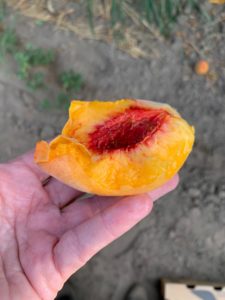 Julie: The first bite that I take of a peach that I have just picked from one of your trees is the most memorable bite of the year, without fail. But the fruit that I bring home with me, that I share with friends, that becomes pies and goes into the freezer for mid-winter cheer, is only part of the story. Being on the farm in the relative cool of the misty early morning with you and your family and the other pickers makes me feel connected: to my maternal grandparents, who were farmers in Wisconsin; to everyone quietly laboring around me; to nature. I am always moved by the experience of both being up in a tree and the perspective it provides and of having my feet firmly planted on the very dusty earth.
Julie: The first bite that I take of a peach that I have just picked from one of your trees is the most memorable bite of the year, without fail. But the fruit that I bring home with me, that I share with friends, that becomes pies and goes into the freezer for mid-winter cheer, is only part of the story. Being on the farm in the relative cool of the misty early morning with you and your family and the other pickers makes me feel connected: to my maternal grandparents, who were farmers in Wisconsin; to everyone quietly laboring around me; to nature. I am always moved by the experience of both being up in a tree and the perspective it provides and of having my feet firmly planted on the very dusty earth.
On a more somber note, how are external forces like drought and the pandemic affecting your approach to the land, crop development, harvest, and how are you finding ways to adapt?
Nikiko: In one of my lowest moments of the pandemic, I had an epiphany – a gift from the earth and the trees. Despite the suffering, losses, and difficulties, the land is still trying to feed us. Even though we’ve added immense strain on our natural systems, extracted and pushed and polluted our world so that extreme weather and unprecedented climatic events now seem constant; despite all of our poor behavior: the trees are still trying to adapt and still giving their fruits. We are adapting in many ways, including looking to real possible futures where we won’t have much water, so what can we grow? How can we change our systems to honor and use every bit of water we do have? These are questions leading us to experiment and, most importantly, find the rituals and sources of endurance and courage we will need to keep going.
Julie: How do you see/use/appreciate the arts and humanities in your daily life on the farm?
Nikiko: I believe part of the gift of being human is making meaning. Interpretation, creativity, meaning-making is part of every day on our farm. To be a farmer, we must be awake to observing living systems around us. We must see and interpret patterns, and we must ascribe meaning to help us keep going when it is 111 degrees Fahrenheit, and more work needs to be done. This year, I got to witness guests on the farm as part of our Adopt-A-Tree program take pause at the end of the harvest day to give thanks: thanks to the trees, thanks to the soil, thanks to the water, thanks to the air, thanks to the sun. Witnessing someone sharing this thanks reignites the spiritual power I will need to keep going. I can’t farm without it.
As part of California Humanities’ participation in the 2021 virtual edition of the annual global humanities festival, Night of Ideas, we asked Nikiko to share her thoughts on her family farm’s history. You can see her short video about “the intergenerational now” included in the 2-hour virtual event here.
Night of Ideas 2021 was a partnership between the Cultural Services of the French Embassy in San Francisco, KQED, San Francisco Public Library, the San Francisco Museum of Modern Art (SFMOMA), and California Humanities.
Photos by Julie Fry at Masumoto Family Farm, July 31, 2021.

